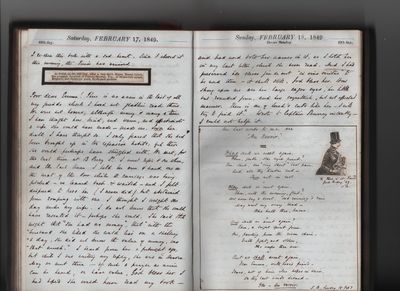Shirley Brooks and the ashes
By JIM McCUE
Although the occasion is unlikely to be much remarked, 2016 will see the 200th anniversary of the birth of Punch's third Editor, Shirley Brooks.
Resourceful and witty, he wrote for many papers, reported from Russia, Syria and Egypt, and took Dickens���s former place as parliamentary correspondent of the Morning Chronicle. He also wrote plays which were staged in the West End with moderate success. His column in the Illustrated London News was engagingly entitled ���Nothing in the Papers���, and he had a novel illustrated by Tenniel. On February 24, Catherine Southon Auctioneers will sell a stray volume of his diary (estimate ��600���800), which includes an elegy for a young sweetheart whom he had never quite had the courage to kiss.
Along with Anthony Trollope, Brooks was among the founder members of the Cremation Society of England, but when he died in February 1874, just a month after its inaugural meeting, the practice was still illegal, so he had to be buried. The irony of this may have led, thanks to his son, the "fl��neur" Reginald Shirley Brooks, to the naming of one of our greatest sporting contests, The Ashes.
In March 1882, a Miss Eliza Williams was granted permission by the Home Secretary to exhume her friend Henry Crookenden, though specifically not to fulfil his wish to be cremated. Nevertheless, according to a long legal report in The Times, after digging him up, she ���caused the body to be cremated at Milan, and the ashes to be returned to England���, where they were put in a vase from his collection and buried. When she then sued his estate for ��321 expenses, her case was dismissed.
Given the thwarting of his own father���s wishes, Brooks junior very probably took an interest in this bizarre case, and had it in mind that summer when, for the first time ever, the England cricket team lost a Test Match to Australia. As journalist himself, he is believed to have been the wit who wrote the facetious death notice in The Sporting Times declaring that English cricket had died at the Oval and that ���The body will be cremated and the ashes taken to Australia���.
Cremation was ruled legal two years later by the judge Sir James Fitzjames Stephen. Neither the mortal nor the literary remains of Shirley Brooks, however, have been exhumed.
Peter Stothard's Blog
- Peter Stothard's profile
- 30 followers




